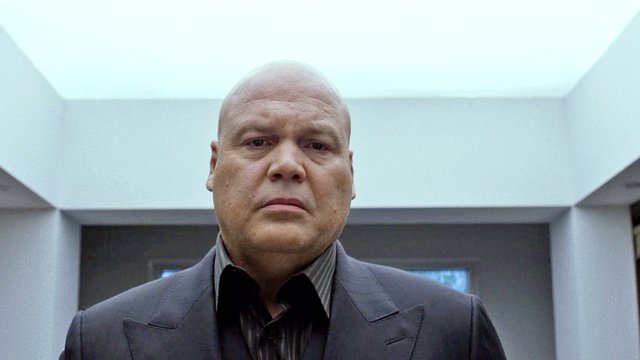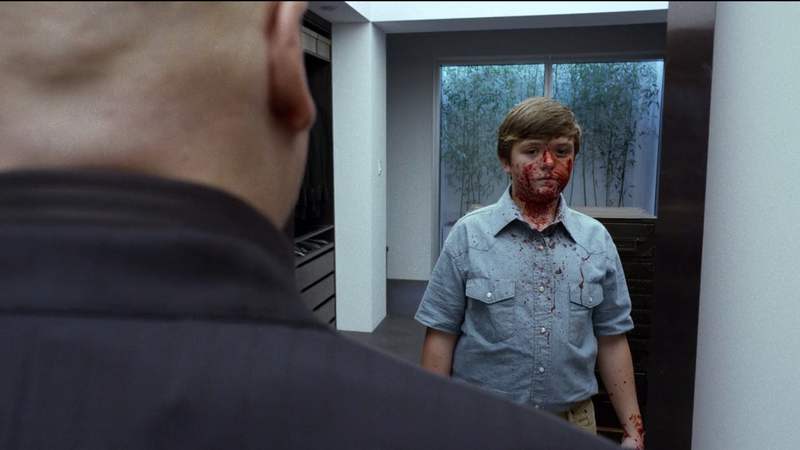Wilson Fisk and the recognition of evil

The series Daredevil (2015) by Netflix, presents a parallel development between two characters: that of Matt Murdock (Charlie Cox) in the superhero Daredevil, and that of Wilson Fisk (Vincent D'Onofrio) in the villain The Kingpin.
Surprisingly, the introduction of Wilson Fisk's character into the series (after a long preamble in the first episodes where he is only mentioned as "the employer" until his name is revealed) shows him in a vulnerable position, as he contemplates artworks in a gallery. The curator, Vanessa Marianna (Ayelet Zurer), approaches him to talk to him about the painting that he observes with such interest; and finally she mentions that the importance of art is how it makes you feel, to which Fisk responds: "It makes me feel alone."
As I said before, during the first episodes of the series, Fisk is mentioned as a mysterious figure who is behind big mafias in New York who commit terrible crimes (the Russian mafia, the Triad and the Yakuza). For the viewer who only follows the series, as well as for those who have read Marvel's comics and know the character, it is impressive that the first scene where we see the character is one where, more than fear or repulsion, it causes us empathy and even compassion. The fact of showing a villain from his most human side is a great bet by Netflix, and a very wise one.
Those of us who know the character's characteristics ask ourselves, "If he shows himself like this, how will we see his brutality?". In the fourth episode of the first season, Fisk beheads a Russian mobster with his car door for interrupting his date with Vanessa.
Vincent D'Onofrio achieves a glorious transition from a sensitive man, who nervously addresses the woman he is attracted to, to a beast full of violence and brute force.
But it's not just his strength that makes Wilson Fisk a fearsome character. He knows that every man has a price, and it is something he applies to perfection, seizing all means, police, government, etc., thus creating threads of corruption everywhere, so that he has control of everything (and everyone).
Fisk becomes an omnipotent man in Hell's Kitchen, which presents a big obstacle for Matt Murdock. This is where the two characters project each other: they both want to make their city the best possible place; Murdock believes he can do this by fighting crime, while Fisk believes that only through power will the goal of transforming the city into "something beautiful" be achieved.
The eighth episode of the first season, "Shadows in the Glass", tells us masterfully the story of Wilson and the birth of his violent nature, the product of an alcoholic and abusive father. While being a kid, Fisk was forced to kill him when he beat his mother.

Telling Vanessa the terrible story of his father's murder, Fisk makes a statement (which ends up being an interrogation): "That's why I always wear these (his father's cufflinks), to remind myself that I'm not cruel just for the sake of cruelty, that I'm not my father, that I'm not a monster... am I?".
Fisk constantly reiterates to himself that he wants to save the city by justifying his despicable actions. It is Madame Gao (leader of the Triad) who makes a key point: "You cannot be both oppressor and savior at the same time. Choose wisely, before others decide for you." It is only after the attempted murder of Vanessa, and the murder of James Wesley (Tobey Leonard Moore), his right-hand man, that the villain begins to accept what he really is: an evil man.
We see this in a scene from episode thirteen (the last of the first season), in which Fisk reflects on the parable of the Good Samaritan (the series always alluding brilliantly to religion, because Matt Murdock is a Catholic man) where the villain finally admits that he always thought he was the Samaritan in the story, a good man who helps his neighbors. However, he realizes that he is "the ill intent who set upon the traveler on a road that he should not have been on."
I emphasize the fact that D'Onofrio's performance gives an impressive twist to the scene, when Fisk recognizes the evil within himself and takes one more step toward his final version: The Kingpin.
As a curious fact, the change of color in Fisk's clothing is a symbolic element that represents his development in the renowned villain of Marvel: in his first appearances in the series he wears black suits, then he changes to gray tones on Vanessa's recommendation, and finally we see him in the suit that the new inmates wear in jail, in white, which is a reference to the suit of the same color, characteristic in comic books.

(Collage made with these images: 1, 2, 3)